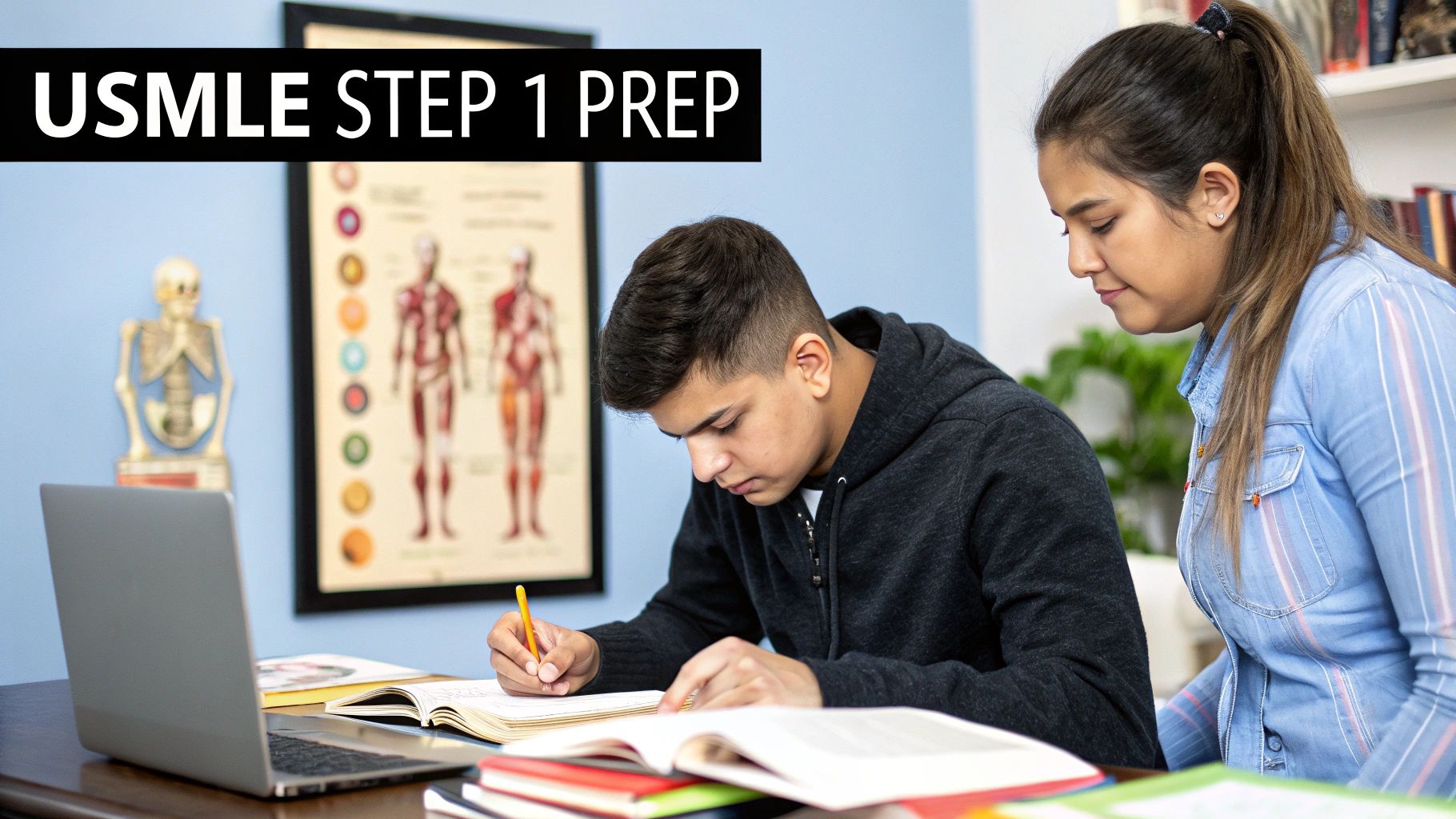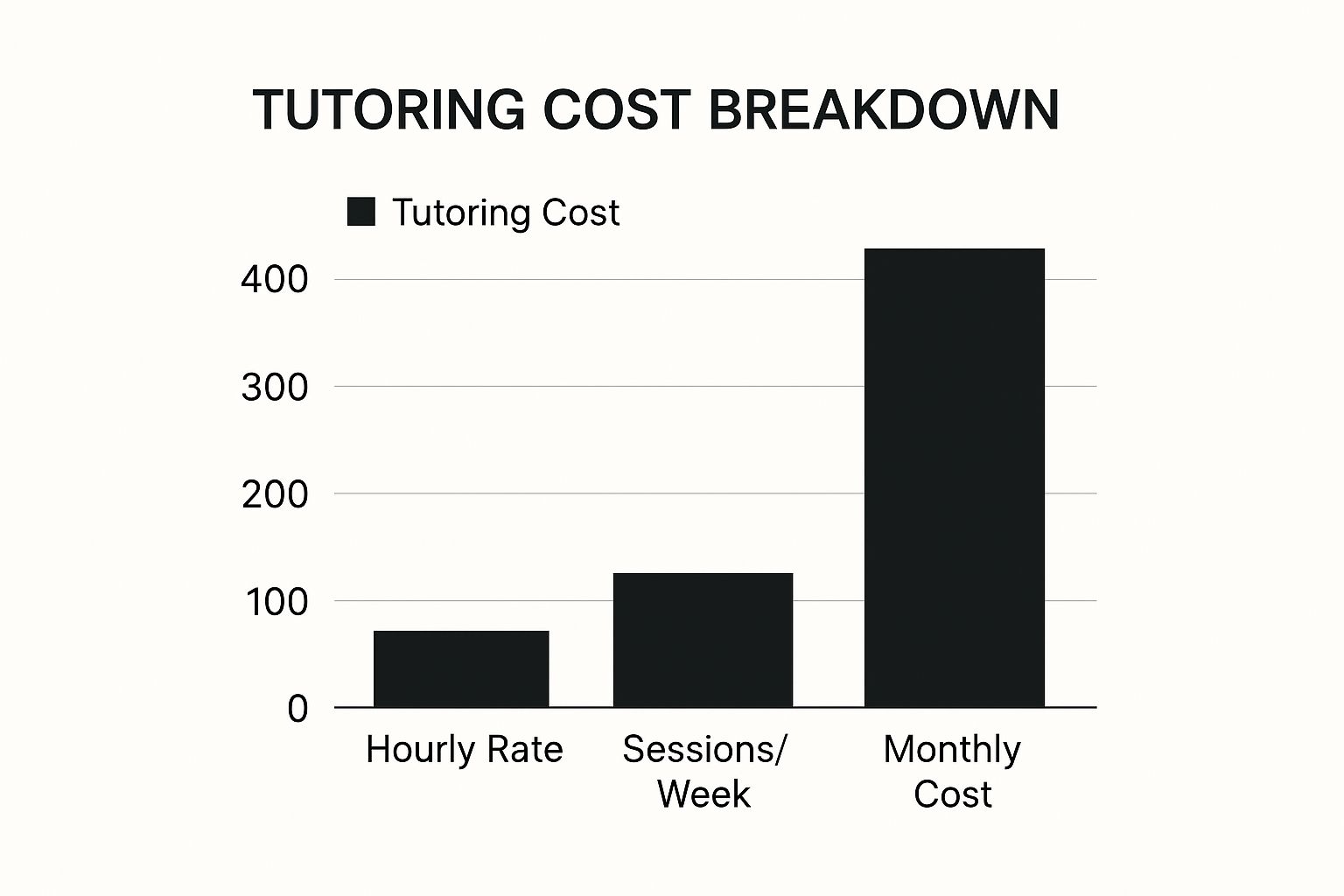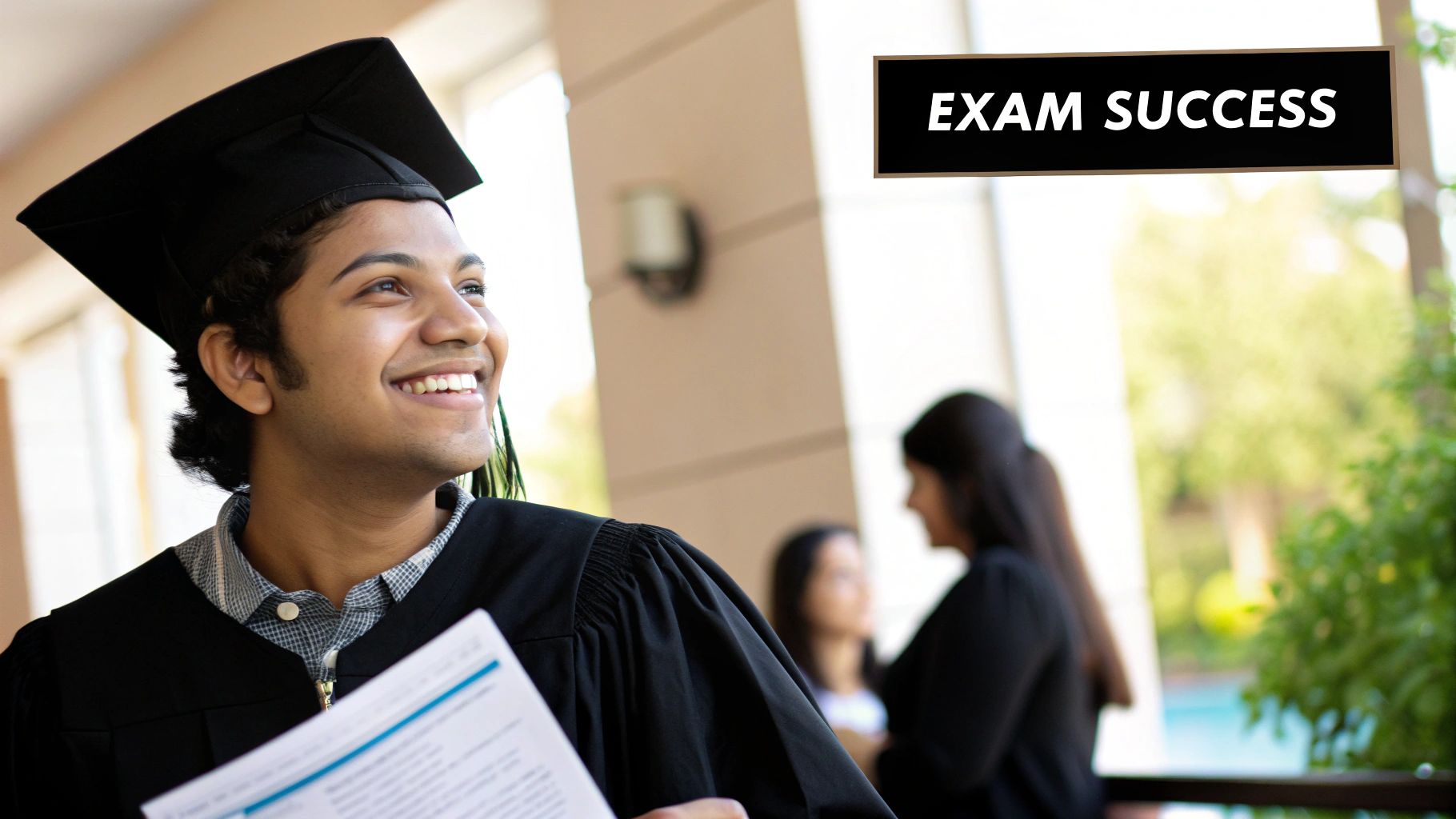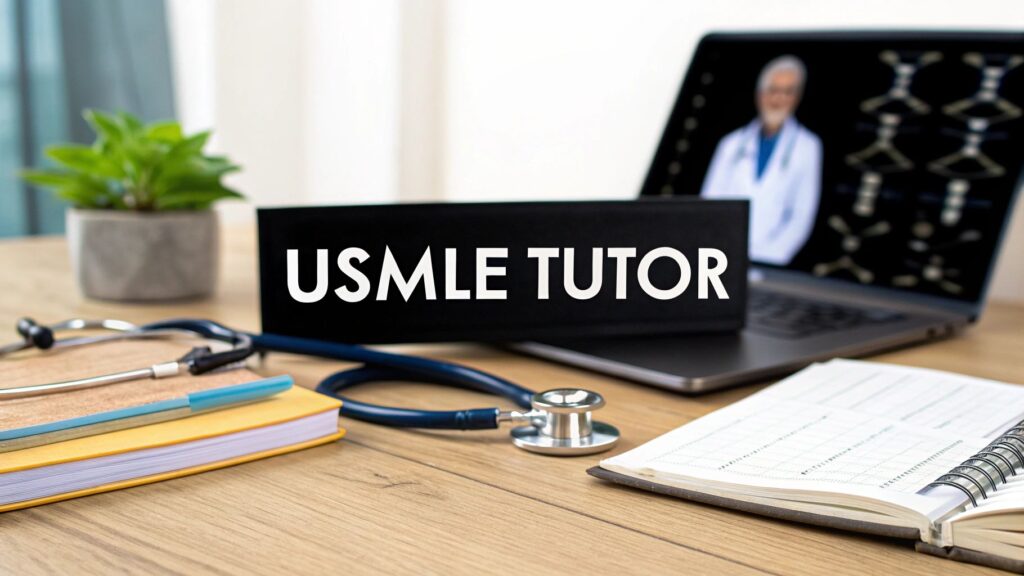Let's be real—the shift to a pass/fail Step 1 didn't magically make the exam easier. It just changed the game. The pressure isn't on chasing a three-digit score anymore. Instead, it's about building a rock-solid foundation that will directly carry over to your Step 2 CK performance and, ultimately, your residency match.
This is exactly where a great USMLE Step 1 tutor has become more crucial than ever.
Why a Tutor Matters More Than Ever in the Pass/Fail Era

Honestly, the switch to pass/fail has been a subtle but massive change. On January 26, 2022, the exam officially moved away from a scored system, and the minimum passing score actually ticked up slightly from 194 to 196. While most students still pass, this small adjustment, combined with an increasingly diverse group of test-takers, means that targeted, efficient prep is non-negotiable.
If you're curious about the numbers, you can read the full analysis of recent USMLE performance data to see how these trends are playing out.
It’s About Mastery, Not Just Passing
One of the biggest myths I hear is that tutors are only for students who are struggling. That couldn't be further from the truth. A top-tier tutor does so much more than drag you across the finish line—they help you master the material in a way that sticks. They are experts at finding those sneaky knowledge gaps you don't even know you have.
Picture this: a student is drowning in pharmacology. They've spent weeks trying to memorize drug names, side effects, and mechanisms, but it all feels like a jumbled mess of disconnected facts. A tutor can completely change that experience.
- They connect the dots. Instead of rote memorization, a tutor shows you how a drug's mechanism is directly tied to its side effect profile. Suddenly, it's not just memorizing—it's understanding.
- They make you more efficient. Why spend hours on low-yield minutiae? A tutor has seen it all and can guide you straight to the most frequently tested concepts and question patterns.
- They keep you honest. It’s way too easy to put off that brutal UWorld block when you're studying alone. A tutor provides that external accountability to keep you on schedule and moving forward.
A great tutor doesn't just give you the fish; they teach you how to analyze the entire pond. They transform your study approach from passive review to active problem-solving—a skill that is absolutely essential for a high Step 2 score.
Ultimately, working with a USMLE Step 1 tutor is an investment in your entire medical career. They ensure the foundation you’re building is strong enough to support you not just through Step 2, but through residency and beyond.
To truly understand the value, it helps to see a direct comparison. Let's break down the practical differences between tackling Step 1 with a tutor versus going it alone.
Tutor vs Self-Study A Practical Comparison
This table outlines the key differences you'll experience when preparing for Step 1 with a tutor compared to relying solely on your own self-study methods.
| Preparation Aspect | Self-Study Approach | USMLE Step 1 Tutor Approach |
|---|---|---|
| Strategy & Planning | Creating a study plan based on online templates or guesswork. Often reactive. | A customized, proactive study plan built around your specific weaknesses and timeline. |
| Identifying Weaknesses | Relying on practice test scores, which can be lagging indicators of knowledge gaps. | Proactively identifying conceptual misunderstandings before they show up as patterns of incorrect answers. |
| Study Efficiency | Spending significant time on both high-yield and low-yield topics without a clear distinction. | Laser-focusing on the most critical, high-yield information and test-taking strategies. |
| Accountability | Self-driven motivation, which can be difficult to maintain over months of intense study. | Structured check-ins and session goals that provide external motivation and keep you on track. |
| Problem Solving | Getting stuck on a tough concept and spending hours searching for a clear explanation online. | Getting immediate, clear explanations and learning a framework to solve similar problems in the future. |
| Test-Taking Skills | Developing strategies through trial and error with practice questions. | Targeted coaching on how to dissect complex question stems, manage time, and avoid common traps. |
While self-study can certainly work for some, a tutor provides a level of personalization, efficiency, and expert guidance that's almost impossible to replicate on your own. They don't just teach you content; they teach you how to think like the test-makers.
Pinpointing Your Personal Study Gaps
Before you even think about typing "USMLE Step 1 tutor" into Google, you need to do some serious self-assessment. Hiring a tutor without knowing exactly where you're struggling is like asking a surgeon to operate without a diagnosis—it’s inefficient and can do more harm than good for your score. The first step is always to create a crystal-clear map of your academic weak points.
This process goes way deeper than just glancing at your NBME practice exam score reports. It's about being brutally honest with yourself about why you're getting certain questions wrong. Is it a true knowledge gap in a beast of a subject like biochemistry, or is the real problem something less obvious?
Moving Beyond Content Knowledge
So many students jump to the conclusion that they just need help with a specific subject. But more often than not, the real reason for a disappointing score is much more nuanced. A truly thorough self-assessment means asking yourself some tough questions and digging into the patterns behind your mistakes.
Think about these common, but very different, problem areas:
- Content Gaps: This is the most straightforward issue. You consistently miss questions about renal physiology or immunology because you genuinely don't have the core concepts down.
- Question Interpretation: You actually know the material, but you get lost in long, complex clinical vignettes. You struggle to figure out what the question is truly asking.
- Test-Taking Strategy: This is a big one. You constantly fall for tricky distractor answers, run out of time on UWorld blocks, or change right answers because you second-guess yourself into oblivion.
- Anxiety and Stamina: You do fine on individual questions or short blocks, but your scores tank during a full-length practice exam. Mental fatigue or test-day anxiety gets the best of you.
Pinpointing whether your main problem is content, strategy, or stamina is the single most important thing you can do. A tutor who is a pharmacology whiz won't be much help if your real issue is managing the clock during a 40-question block.
Identifying Your Unique Student Profile
Your personal situation has a massive impact on the kind of support you'll need. An International Medical Graduate (IMG), for example, is often facing a completely different set of hurdles than a student who is retaking the exam after a previous attempt. Figuring out which profile you fit into will help you find a tutor who specializes in your exact needs.
For a deeper dive into crafting a study plan tailored to your needs, check out our complete guide on how to study for USMLE Step 1.
Let's break down a few common student scenarios.
- The Content-Deficient Student: This student's NBME score reports tell a clear story, with consistent underperformance in one or two specific organ systems or disciplines. Their mission is to find a tutor who is a true subject matter expert and can break down those tough topics into bite-sized, understandable pieces.
- The IMG Student: This student might have a rock-solid knowledge base from their medical school but finds the unique style and clinical context of USMLE questions challenging. They need a tutor with proven experience helping IMGs bridge those cultural and educational gaps.
- The Retaker: This student needs far more than a simple content review; they need a complete strategic teardown and rebuild. The right tutor will do a deep dive into their prior score report to diagnose exactly what went wrong and help them build an entirely new, winning game plan from scratch.
Once you’ve put a name to your core challenge and student profile, you can start your search with purpose. You'll be looking for a partner who has a track record of solving the exact problem you're facing.
How to Vet and Choose the Right Tutor

Alright, you’ve done the self-assessment and know what you need. Now comes the most important part: finding the right USMLE Step 1 tutor to help you get there. This isn’t just about hiring someone with a high score; it’s about finding a true teacher who can translate their success into your success.
Think of it this way: you're not just getting an instructor, you're finding a partner for one of the most critical legs of your medical journey. Their ability to adapt to your learning style, simplify dense topics, and give pointed, actionable feedback is what separates a fantastic investment from a total waste of time and money.
Beyond the Score Report
It's tempting to be wowed by a tutor who flaunts a 260+ on their Step 1. But let's be real—that number only proves they mastered the material for themselves. It says absolutely nothing about their ability to teach it to you. A high score is the entry ticket, not the whole game.
Your focus should be squarely on their teaching skill and a proven history of helping students like you. This is especially true now that Step 1 is pass/fail. The real prize is building a rock-solid foundation that propels you to a killer Step 2 CK score, which program directors are scrutinizing more than ever.
So, how do you get past the score and find a genuinely great teacher? You have to ask the right questions. Here’s what I’d want to know before hiring anyone:
- Real Teaching Experience: How long have you been tutoring for Step 1, specifically? Have you worked with students who have my background (e.g., IMG, needing to retake, struggling with a specific subject like pharmacology)?
- Their Teaching Philosophy: How do you adjust your teaching for different learning styles? What’s your game plan when a student is hitting a wall with motivation?
- The Nitty-Gritty: Let’s get practical. Can you show me how you’d break down one of my incorrect UWorld blocks? Describe what a typical session with you actually looks like from start to finish.
- Structure and Progress: Do you help create a structured study plan? How will we track my progress? A solid schedule is non-negotiable, and you can get a head start by looking at our guide on building a USMLE Step 1 study plan.
Spotting Critical Red Flags
Just as crucial as knowing what to look for is knowing what to run from. Some promises and behaviors are massive red flags that scream "unprofessional" or, worse, "ineffective." If it sounds too good to be true, it almost always is.
Major Red Flags to Watch For:
- Guaranteed Scores or a "Pass" Guarantee: This is the biggest red flag. No ethical tutor can promise a specific outcome. Your success is a partnership; it depends on your hard work just as much as their guidance.
- Refusing a Trial Session or Consultation: A confident, experienced tutor will have no problem with a short, free chat. They know their value and want to ensure it's a good fit for both of you. Hiding behind a paywall is a bad sign.
- A "One-Size-Fits-All" Program: If a tutor pushes a rigid, cookie-cutter plan before even asking about your specific weaknesses and goals, they aren't a real mentor. They're a salesperson. Run.
Making Every Tutoring Session Count
Landing a great USMLE Step 1 tutor is a huge win, but let's be clear: that’s only half the battle. Your real score improvement hinges entirely on what you do during those sessions. I've seen it time and time again—the difference between a student who makes massive strides and one who just spins their wheels comes down to one simple thing: active partnership versus passive listening.
If you just show up expecting your tutor to magically pour knowledge into your brain, you're setting yourself up to waste a lot of time and money. The students who truly crush Step 1 treat every tutoring session like a high-stakes strategy meeting where they are the senior partner.
Be Brutally Honest About Your Weaknesses
The absolute golden rule for getting your money's worth? Leave your ego at the door. Your tutor can't fix problems they don't know exist. Pretending you've got the renin-angiotensin-aldosterone system down cold when you're secretly lost is only sabotaging your own score.
Get specific. "I'm bad at cardiology" isn't helpful. Instead, try this: "I can't seem to figure out the difference between diastolic and systolic heart failure based on the clues in a question stem." That kind of honesty lets your tutor zero in on the exact source of your confusion.
The most productive sessions I've ever been a part of start with a student saying, “I know this is basic, but I’m completely lost here. Can we start from scratch?” That vulnerability isn't a weakness; it's your biggest strength in this process.
This directness transforms your sessions from a broad, generic overview into a surgical strike on your knowledge gaps. Your tutor becomes a precision tool, not a blunt instrument.
Arrive with an Agenda and Co-Create Goals
Never, ever walk into a session blind. The most successful students I've worked with treat their tutor's time—and their own—like gold. They show up with a clear agenda that turns every hour into a powerhouse of productivity.
Before you meet, pull together a quick list of what you need to accomplish. It doesn't have to be complicated.
- A list of problem questions: Bring 3-5 tough UWorld questions you bombed. More importantly, come with a theory on why you think you got them wrong. This is where the real learning happens.
- Sticking points: What topics from your own study time are still fuzzy? Jot them down.
- A session goal: Kick off the meeting by saying something like, “My main goal today is to finally nail down the brachial plexus and then apply it to two blocks of neurology questions.”
Taking this initiative flips the dynamic. Instead of your tutor guessing what you need, you two become collaborators on a shared mission. When you co-create the session's goals, you guarantee that every single minute is spent on the activities that will give you the biggest score bump. This focused, intentional approach is what separates the students who just get by from those who truly master the material for Step 1.
Comparing Tutoring Models and Costs
So, let's talk brass tacks. You're ready for a tutor, but what does that actually look like? The world of USMLE tutoring isn't a one-size-fits-all market. Your final choice will come down to a very personal mix of your budget, how you learn best, and exactly what you need to fix.
You’ll generally find three main flavors: one-on-one private tutoring, small-group sessions, and those big commercial prep courses. Each has its own rhythm. Private tutoring is all about you—a completely personalized deep dive. Group settings, on the other hand, can bring a sense of camaraderie and keep you motivated with a little friendly competition.
To give you a clearer picture, here’s a breakdown of what you can expect to invest in a USMLE Step 1 tutor.

It's true, the hourly rate for private tutoring is the highest. But that price reflects a service built from the ground up to target your specific weaknesses, which can be invaluable.
Finding the Right Fit for Your Situation
The "best" tutoring model is completely dependent on your story. Are you retaking the exam? You'll likely need a level of detailed analysis and a strategic overhaul that you can only get in a one-on-one setting. But if you're already on track and just need a little extra horsepower in a tough subject like cardiology, a small group might be the perfect fit.
This is a critical decision, especially when you look at the performance data. The NBME numbers paint a stark picture that drives the tutoring market. In 2021, the first-time pass rate for U.S. and Canadian M.D. students was a solid 96%. For those retaking the exam? It dropped to 66%.
The gap is even more pronounced for international medical graduates (IMGs). The first-time pass rate was around 82%, but it plummeted to just 45% on repeat attempts. These stats from the USMLE performance data report show exactly why specialized, targeted tutoring is in such high demand.
Choosing a tutor isn't just about finding an expert; it's about finding an expert in your situation. An IMG needs a tutor who understands the nuances of bridging different medical curriculums, while a retaker needs someone skilled in diagnostic analysis.
This is precisely why you have to vet a tutor's experience with your specific profile. A great private tutor for USMLE Step 1 can be the single most important factor in your success by providing support that’s truly tailored to you.
A Clear Look at Your Options
To help you sort through this, let's put the most common tutoring models head-to-head. The table below breaks down the nuts and bolts of each option—what it costs, who it’s really for, and the main trade-off you’ll be making.
USMLE Tutoring Models Cost and Benefit Analysis
Here's a comparison of common tutoring models to help you choose the best fit for your budget and learning style.
| Tutoring Model | Typical Cost Range (per hour/package) | Best For | Key Drawback |
|---|---|---|---|
| One-on-One Tutoring | $100 – $250+ per hour | Students needing personalized attention, retakers, and IMGs. | Highest cost per hour. |
| Small-Group Tutoring | $50 – $100 per hour | Students who learn well with peers and want accountability. | Less individual focus; the pace is set by the group. |
| Commercial Prep Course | Varies widely (often package-based) | Students who prefer a highly structured, lecture-based format. | Lacks personalization and adaptability. |
Ultimately, the goal is to find the structure that gives you the best return on your investment—not just in dollars, but in confidence and score points. Use this as a starting point to narrow down your search and find the partner who can help you cross the finish line.
Common Questions About USMLE Tutors

When you're deep in the trenches of Step 1 prep, thinking about hiring a USMLE Step 1 tutor is a big deal. It feels like a major decision, and you want to be absolutely sure you're making a smart move. Let's walk through some of the most common questions and concerns I hear from students just like you.
These aren't just minor details; they cut right to the heart of what makes a tutoring relationship work. Getting clear on these points from the start helps you set the right expectations and get the most out of your investment.
How Far in Advance Should I Hire a Tutor?
This is easily one of the most frequent—and important—questions I get. For most students, the sweet spot is hiring a tutor 3-6 months before your test date.
This timeframe gives you enough runway to do things properly. You can go through a complete diagnostic of your strengths and weaknesses, build a genuinely personalized study plan, and work through the tough subjects without the crushing pressure of a deadline right around the corner.
But, like with anything in med school, there are exceptions. If you're struggling with the foundational sciences early on, getting a tutor sooner can be a game-changer. It stops those small knowledge gaps from turning into major problems down the line.
And for students retaking the exam? My advice is always the same: contact a tutor the moment you get your score report. This lets you immediately dig into what went wrong and gives you the maximum amount of time to build a completely new—and much more effective—strategy from scratch.
Is Tutoring Still Worth It Now That Step 1 Is Pass/Fail?
Absolutely. In fact, I'd argue it's more important than ever.
The game has changed. The goal isn't just hitting a magic three-digit number anymore; it's about achieving a deep, functional mastery of the material. Why? Because a rock-solid Step 1 foundation is directly linked to a higher Step 2 CK score—which is now a far more critical factor for residency directors.
Think of it as an investment in your future competitiveness. A good tutor ensures you don’t just scrape by with a pass. They help you build the kind of profound understanding that will pay off during your clinical rotations, on Step 2, and ultimately, in your residency applications.
What Should I Do If My Tutor Isn't a Good Fit?
You have to address this head-on, and quickly. Your study time is your most valuable asset during dedicated, and you can't afford to waste a single session on a partnership that isn't working.
Start by giving specific, constructive feedback. Don't just say, "This isn't working for me." That's too vague. Try a more targeted approach:
- "Could we spend more time walking through my thought process on the questions I get wrong, instead of just reviewing the correct answer?"
- "I learn best by doing. Is there a way we can incorporate more practice questions directly into our sessions?"
If you've given clear feedback and things still aren't improving, or if the problem is a fundamental personality clash, don't be afraid to end the relationship. Any reputable tutor or tutoring company understands that not every pairing is a perfect match. Your success is the priority, and finding the right person to help you achieve it is all that matters.
At Ace Med Boards, we specialize in creating those successful partnerships. Our expert tutors are dedicated to understanding your unique challenges and crafting a personalized plan to help you master the material for Step 1 and beyond. Start with a free consultation to see how we can help you achieve your goals at https://acemedboards.com.

